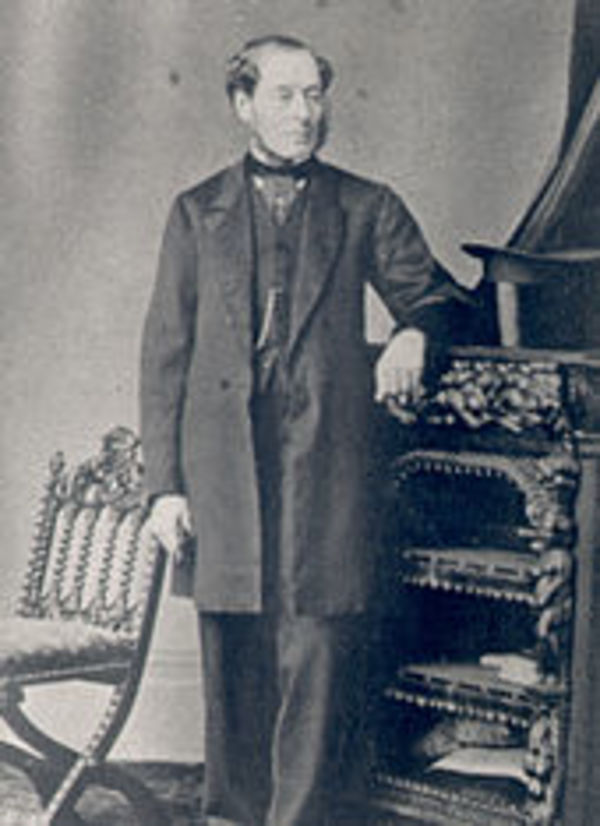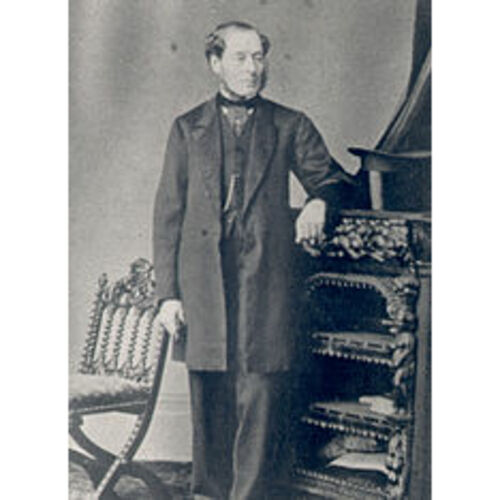
Source: Courtesy of Wikimedia Commons
HOLL, JOHN MYRIE, farmer and politician; b. 16 Aug. 1802 in Lambeth, London, England, eldest son of John M. Holl and Ann Lewis; d. 6 April 1869 in London.
John Myrie Holl spent his early life in England where he was educated at Cheam School in Surrey. In 1825 he married Ann, daughter of William Smart, a London silk manufacturer, and they had six sons and one daughter; for about ten years they lived near Bideford, Devon. At age 34, Holl immigrated to Prince Edward Island with his wife and family.
Shortly after his arrival in 1836 Holl purchased over 600 acres of land in Lot 32 near Charlottetown which he called Kenwith after his Bideford home. He had a practical interest in farming and soon became an active member and, by 1855, president of the Royal Agricultural Society. His holdings outside his own farm were marginal; however, between 1850 and 1854 he was involved in extensive land transactions when he acted as one of the trustees of the large estate of Charles Worrell, eventually purchased by the Island government in 1854 [see William Henry Pope*].
Lieutenant Governor Sir John Harvey* remarked in 1836 that “Persons of Mr. Holl’s class are exactly the description of Emigrant most wanted in this Colony,” and after the creation of separate Legislative and Executive councils in 1839, Harvey’s successor, Charles Augustus FitzRoy*, appointed Holl to the Legislative Council, describing him as “an independent Gentleman resident in Queen’s County entirely unconnected with the Government, or with the Proprietors or Tenantry.” Although for several years Holl eluded any party designation, during the 1840s his class background was reflected in his stand on land tenure and responsible government. By 1841 a quasi-feudal system of tenure was clearly evident on the Island with over two-thirds of the land occupied by leaseholders. A radical Escheat party, led by William Cooper, had gained ascendancy in the assembly by advocating forfeiture of unsettled lands and their resale on a freehold basis. Under the influence of the absentee proprietors the Colonial Office rejected as impractical both escheat and the later proposal, a land purchase act authorizing the crown to buy out absentee owners. Holl endorsed the principle of voluntary sale as a settlement of the land question but agreed with a majority of the Legislative Council that the crown and the proprietors should approve any measure passed. A profound respect for property caused Holl in the early 1840s to oppose any legislation tending to interfere with land titles.
The struggle for responsible government was intimately tied to the land tenure question for it was generally understood that free land would be the first objective of a popularly controlled executive. As a landowner Holl might have feared such a change in the constitution; yet in the late 1840s the interpretation of the responsible system on the Island was fluid enough to encompass supporters who might have evaded its literal implementation. Holl voted for the 1847 resolutions favouring responsible government and his appointment to the Executive Council the same year was hailed by Reformers as an endorsement of their cause. As the issue of principle sharpened, however, Holl subscribed to the British view that “time and the natural progress of events” were necessary before the small Island society would have the requisite property, education, and leisure for self-government. But the impatient Liberal majority in the assembly, led by George Coles*, used their newly acquired control of supply to force the issue. In 1851 Holl and the other executive councillors had to resign to make way for a new executive possessing the confidence of the elected majority.
Debate concerning the application of the responsible principle soon brought Holl to the forefront of the conservative forces of Island politics. The first responsible cabinet under Coles’ leadership was based on the system whereby departmental heads held their seats in the legislature until they lost the confidence of the house. Slow colonial adjustment to cabinet discipline soon resulted in a Liberal split over a salaries bill which would put public officers above suspicion by replacing fees with fixed salaries. Since the concession of self-government Edward Palmer*, Conservative leader in the assembly, and Holl in the Legislative Council had argued that the independence of the legislature would be better preserved and more responsibility obtained if salaried departmental officers did not hold seats in the legislature. A summer election gave the Conservatives an opportunity to promote non-departmentalism, a policy of administrative and legislative separation with strong American overtones. Coles, already in trouble over high education taxes, lost his appeal to the people and in February 1854 was defeated by a Conservative majority in the assembly. In April 1854, as senior member and leading Conservative in the Legislative Council, Holl became the first Conservative premier under responsible government.
The Holl administration lasted but four months. A large Liberal majority in the appointed Legislative Council fought the Conservatives’ major legislation – the Maine liquor law prohibiting sale of alcoholic beverages, an appropriation bill, and a salaried officers’ bill excluding government members from departmental office. Siding with the Liberals, Lieutenant Governor Sir Alexander Bannerman opposed the Conservative view of the practice of responsible government as un-British and boldly dissolved the assembly on a technicality, against the wishes of his Executive Council. While Palmer fought an election in June, Holl with Thomas Heath Haviland represented the Island at a conference in Quebec on the Reciprocity Treaty under negotiation between Britain and the United States. Coles’ return by the enlarged electorate led the Conservatives to resign in July.
Holl’s opposition to the extension of democracy and his agency for the Worrell estate increased his identification with the landed interest. His worst fears of popular government seemed to be realized in the new assembly. He saw the 1855 acts compensating tenants for improvements and imposing a tax on the nominal rent of proprietors as a type of class legislation compelling owners of land to sell to the local government tinder the Land Purchase Act of 1853, a situation he described as “a species of Legislative Robbery.” The conviction that “Louis Blanc’s Communist Doctrines in so far as P.E. Island is concerned are no longer theory” undoubtedly influenced Holl’s decision to return to England in 1855.
In June of that year 300 prominent citizens of the Charlottetown area presented Holl with a farewell address emphasizing his public and private contribution to the community. During 19 years’ residency he had supported and led the Auxiliary Bible Society and the Colonial Church Society; he had been a justice of the peace, a commissioner for prison discipline, a member of the Board of Health, and a commissioner for superintending the construction of the Colonial Building (Province House). All shades of the political spectrum acknowledged his judgement and prudence. His conservatism, a personal concern for measured economic and social progress, might have been seen as a positive force in another developing colony. In 19th century Prince Edward Island, however, the overwhelming desire for freehold tenure would not tolerate moderation. Two of Holl’s sons remained to farm the Kenwith estate and continued their father’s interest in the agricultural improvement of the Island.
Useful information was supplied by Mr F.M. Holl in a letter to the DCB, 23 June 1962. PANB, REX/le/1g, Harvey, Letterbook, 28 Oct. 1836–18 July 1837, p. 10. PAPEI, P.E.I., Executive Council, Minutes, 1837–55 (mfm. at PAC); Records of land registration, general indexes to 1872. PRO, CO 226/54, 222–27; 226/60, 254–55; 226/71, 566; 226/73, 9–11, 384–85; 226/83, 87–88, 92, 123, 126–29, 141–115, 148, 234–39; 226/84, 217; 226/85, 221, 225–31. P.E.I., Legislative Council, Journal, 1840–55. Examiner (Charlottetown), 13 Nov. 1847. Haszard’s Gazette (Charlottetown), 1 Feb., 20 July, 30 April, 4, 11, 18, 21 May, 8 June, 3 Aug., 5 Oct. 1853; 15, 18, 25 Feb., 15, 19, 29 April, 3, 6, 17, 20, 31 May, 7 June, 1, 5, 12 July, 2, 5 Aug., 6 Sept. 1854; 13 June 1855. Islander, 24 May, 7 June 1844; 5 April 1845; 28 March 1846; 30 April, 12, 19 Nov. 1847; 13 Oct. 1848; 5 July 1850; 28 May 1852; 8 April, 27 May 1853; 17, 24 Feb., 17 March, 21 July 1854; 16 Feb., 15 June 1855. Royal Gazette (Charlottetown), 4 Aug. 1840; 30 March, 1 May 1841; 26 March 1844; 25 March 1845; 13, 27 April 1847; 9, 16 May 1848; March 1849; 21 July 1851; 29 March, 3, 5 April 1852; 4 April 1853. Times (London), 26 April 1866. Prince Edward Island almanack . . . (Charlottetown), 1853. The Prince Edward Island calendar . . . (Charlottetown), 1836–37, 1840–41, 1843–45, 1847, 1850–51, 1855. Canada’s smallest province (Bolger). W. R. Livingston, Responsible government in Prince Edward Island: a triumph of self-government under the crown (University of Iowa studies in the social sciences, IX, no.4, Iowa City, 1931). MacKinnon, Government of P.E.I., 61–85. D. C. Harvey, “Dishing the Reformers,” RSC Trans., 3rd ser., XXV (1931),
Cite This Article
Mary K. Cullen, “HOLL, JOHN MYRIE,” in Dictionary of Canadian Biography, vol. 9, University of Toronto/Université Laval, 2003–, accessed April 6, 2025, https://www.biographi.ca/en/bio/holl_john_myrie_9E.html.
The citation above shows the format for footnotes and endnotes according to the Chicago manual of style (16th edition). Information to be used in other citation formats:
| Permalink: | https://www.biographi.ca/en/bio/holl_john_myrie_9E.html |
| Author of Article: | Mary K. Cullen |
| Title of Article: | HOLL, JOHN MYRIE |
| Publication Name: | Dictionary of Canadian Biography, vol. 9 |
| Publisher: | University of Toronto/Université Laval |
| Year of revision: | 1976 |
| Access Date: | April 6, 2025 |



